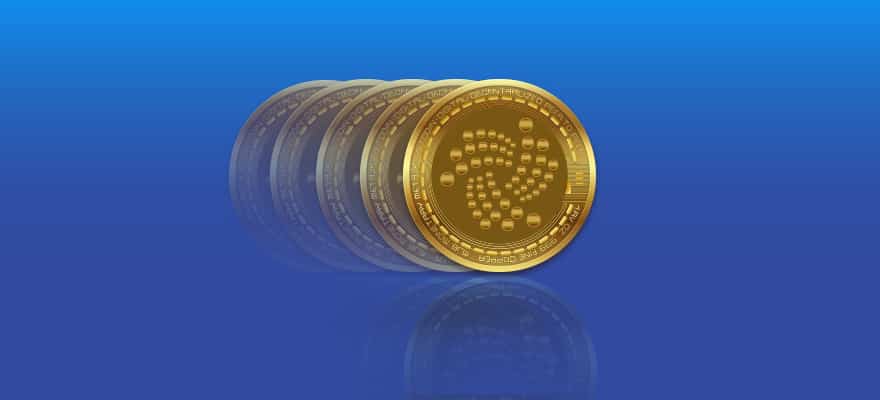As cryptocurrency and distributed ledger technology continue to enter further into mainstream technological and pop cultural spheres, Bitcoin isn’t the only crypto token that people have heard of anymore. In fact, a growing number of ‘altcoins’ have made their way into the public eye as and technological advances.
One of these cryptocurrencies is IOTA (mIOTA). Created by David Sønstebø, Dominik Scheiner, Serguei Popov, and Sergey Ivancheglo, the network has been slated as a revolutionary technology for the Internet of Things and machine-to-machine (m2m) communication.
In fact, the ‘IOT’ in ‘mIOTA’ stands for ‘Internet of Things’ (IoT); the ‘m’ in the SI system of measurement. (There has been some dispute over what the ‘A’ stands for.)
A growing number of use cases have been developed for IOTA. For example, the network could be integrated into smart power grids in such a way that every watt and command would be recorded. Owners of solar panels that produce extra electricity could be paid for every watt they produce in real time. Not only does this enable more efficient energy uses, it also provides an opportunity to easily collect precise data that could be analyzed and monetized.
Why is IOTA So Well-Suited for IoT Integration?
There are several features of the network that have been implemented to make it highly suitable for integration with the Internet of Things, microtransactions, and m2m (machine to machine) communication: namely, the IOTA network has no fees, and is highly scalable. The IOTA network has also been developed to be resistance to hacks from quantum computers.
The IOTA network’s scalability is made possible because of the unique form of DLT (distributed ledger technology) that powers it. The IOTA network does not run on a blockchain–instead, it operates on something called a ‘Tangle.’
The Tangle does not use miners or forgers to validate its transactions. Rather, every transaction that is added to the Tangle automatically validates two previous transactions. Therefore, the network is (essentially) infinitely scalable–the more transactions that do take place on the IOTA network, the more transactions can take place on the IOTA network.
There has been some criticism of the IOTA network. Some voices in the cryptocurrency community have raised concerns that the network is overly centralized; scientists at MIT published a report detailing issues they had discovered with IOTA’s software in late 2017.
A Growing Number of Partnerships for the IOTA Foundation
In spite of the criticism, however, the Berlin-based IOTA Foundation has garnered a number of high-profile partnerships and collaborations since its establishment several years ago. The Foundation is a non-profit organization created with the specific purpose of “[developing] the next generation of protocols for the connected world.”
Most recently, the IOTA Foundation partnered with UNOPS (the United Nations Office for Project services) to explore how the IOTA network could be used to increase the efficiency of UNOPS’ operations. Yoshiyuki Yamamoto, UNOPS Special Advisor on Blockchain Technology, said in an official statement that “we share a vision where machines, devices, sensors and people connect and communicate to each other – it’s the world of ‘Industry 4.0.’”
Additionally, the IOTA Foundation created a data marketplace with more than twenty participating companies (including Fujitsu and Microsoft) near the end of 2017. The Foundation also formed a partnership with the International Transportation Innovation Center (ITIC) to work on creating autonomous vehicle testbeds.
Most recently, IOTA was added as a tradeable asset on eToro, a UK-based investing platform that offers its users the ability to trade cryptocurrencies, stocks, ETFs, currencies, indices, and commodities. Traders on eToro can also set up their portfolios to automatically copy the trades of leading investors.
IOTA as an Investment
IOTA’s price is still largely determined by speculation. In other words, the IOTA network has not yet been implemented for use on any kind of widespread scale–therefore, the value of IOTA tokens is largely determined by investor’s beliefs about the future of the network.
The also moves in tandem with the cryptocurrency markets at large. In other words, when the cryptocurrency markets are bullish, IOTA is often also bullish. The opposite is true as well–when the markets are in the midst of a downward bend, IOTA is also likely to be losing value.
The addition of IOTA onto eToro on August 20th had a positive effect on IOTA’s valuation in the short term sense–the cryptocurrency moved from roughly $0.51 to nearly $0.79. The price has since cooled to $0.58, but it appears that another bullish run is underway.
Disclaimer: Cryptocurrencies are a highly volatile unregulated investment product. There is no EU investor protection. Your capital is at risk.





Be First to Comment